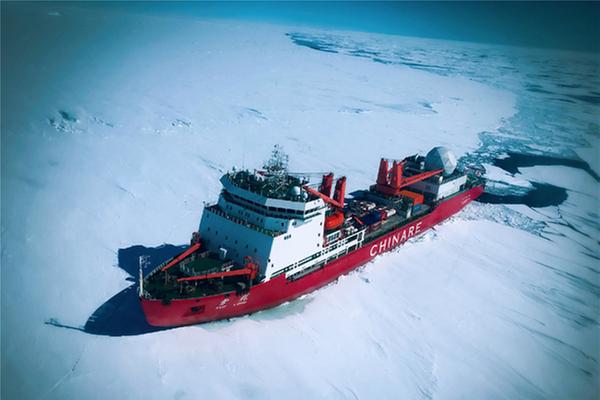Acidification of Arctic to be studied on icebreaker

 |
| Research vessel and icebreaker Xuelong on a mission in Antarctic on Dec 5, 2016. [Photo/CCTV] |
Cutting-edge environmental research to include the spread of microplastics
The Chinese icebreaker Xuelong, or Snow Dragon, will set out for northern seas on Thursday on a quest to measure the acidification of the Arctic Ocean.
It is internationally acknowledged that ocean acidification, mainly caused by rising carbon dioxide emissions, is worsening in the Arctic, according to Xu Ren, deputy head of the Shanghai-based Polar Research Institute of China. It is the first time the institute has targeted Arctic acidification.
"It may trigger environmental disasters, such as the bleaching of coral reefs, and affect marine biodiversity. Ocean acidification is a major international cutting-edge topic, after global warming and marine pollution," Xu, team leader of this year's 83-day expedition, said at a media briefing on Tuesday.
"Although the situation in the Arctic Ocean is undoubtedly better than that of the oceans adjacent to continents with a dense population, it will deteriorate with global warming and the decrease of sea ice in the Arctic."
The expedition also will undertake scientific research on marine microplastics, which are tiny pieces of plastic, often used in facial cleansers and similar products as scrubbers, that pass through wastewater treatment plants and reach the ocean, officials said. It will be the first time for the issue to be studied during an institute expedition, which also conducts studies in multiple disciplines such as marine biology, meteorology, geology and chemistry.
According to Lin Weiqing, deputy director of the Shanghai Academy of Environmental Sciences, microplastics have already been discovered in zooplankton and could eventually find their way to human stomachs if consumed by fish and other creatures higher up the food chain.
The icebreaker will attempt China's first circumnavigation of the Arctic rim during the planned 35,000-kilometer voyage with a 96-member expedition team on board. All the targeted research will be carried out throughout the trip, said Shen Quan, captain of the vessel and deputy team leader of the expedition.
China's polar expeditions to the Arctic will take place once a year in order to realize long-term, systematic and standardized scientific observations and explorations of the region, Xu said.
Such expeditions started in 1999 and have been undertaken seven times, but a greater frequency is needed given the rapid chances in the Arctic, officials said.
"As a responsible great power, China must make due contributions in international governance of the Arctic region," Xu said.
- A glimpse of Xi's global insights through maxims quoted in 2024
- China's 'Ice City' cracks down on ticket scalping in winter tourism
- Iron stick yams revitalize Wenxian county
- Party chief of Guilin under investigation
- Two radio telescopes put into use to support deep space exploration
- Joint action transforms Mekong region




































